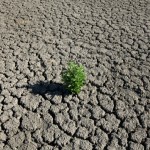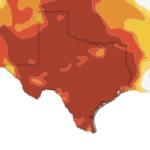Thanks to the Drought, Farmland Values Mostly Flat in Texas

Photo by Scott Olson/Getty Image
Juan Rico walks by a barren cotton field July 27, 2011 near Hermleigh, Texas. A severe drought has caused the majority of dry-land (non-irrigated fields) cotton crops to fail in the region.
If you’re a farmer in the Midwest, chances are your land values have gone up recently. A new survey by the Federal Reserve Bank of Kansas City, Mo. says that irrigated farmland value in those areas grew more than 30 percent over the last year’s first quarter. Factors such as higher crop prices and timely rains have caused demand for cropland to persist.
But if you’re a Texas farmer, you’re not seeing the same growth. The Federal Reserve Bank of Dallas’ most recent survey shows that Texas farmland values remain largely unchanged. Irrigated land values rose a little bit – up 9%. But cropland and ranchland values are essentially the same as they were this time last year, while they have gone up between sixteen and thirty percent in the Midwest.
Emily Kerr of the Federal Reserve Bank of Dallas says that drought is definitely a factor in Texas’ agricultural land value stagnation.
Kerr says that by suppressing crop profitability and, thus, land values, the drought resulted in the overall suppression of land sales. “When land is changing hands infrequently, there is less opportunity for prices to rise,” Kerr says. The drought cost an estimated $7.62 billion in agricultural losses, nearly half of that in livestock loses.
But not all rural land is going down in value. According to the Federal Reserve Bank of Dallas’ first quarter Agricultural Survey, the Texas land that’s most valuable now is the land containing mineral resources. Land with oil and gas is leasing at “unbelievable” rates, Kerr says, so mineral-laden land values are far greater than the use of agricultural land could return in investment.

